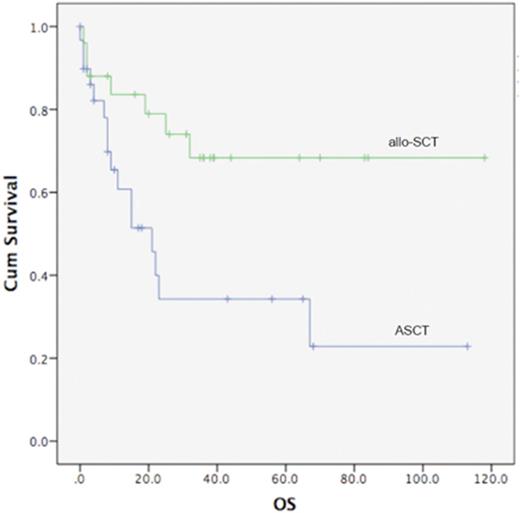Abstract
Introduction: Aggressive T-cell lymphomas often carry poor prognosis. With the exception of ALK+ anaplastic large cell lymphoma (ALCL), median survival for most entities is < 3 years from diagnosis. Whilst stem cell transplant (SCT) consolidation is sometimes used in an attempt to improve survival, its role remains controversial. Encouraging results have been reported with both autologous (ASCT) and allogeneic stem cell transplant (allo-SCT) but it is unclear if one is better than the other. To inform this debate, we set out to examine outcomes of patients receiving SCT consolidation for aggressive T-cell lymphomas at our institute over a 10-year period (between 2005 Ð 2015), comparing results of ASCT versus allo-SCT.
Methods: Review of our transplant database identified 59 patients receiving SCT for T-cell lymphomas between the years 2005 - 2015. We excluded 4 patients with low grade T cell lymphomas (mycosisfungoides/sezarysyndrome) from analysis. A further 4 patients were excluded as they had 2 SCT procedures (ASCT followed by an allo-SCT). Thus, 51 patients were eligible for analysis; all having received a single SCT procedure (either ASCT or allo-SCT) for treatment of aggressive T-cell lymphoma.
Results: Median age of the entire cohort at the time of transplant was 54 years (range 18-72 years) with 39 male and 12 female patients. The most frequent histologies were: ALCL (n=13), angioimmunoblastic T cell lymphoma (n=10) and high grade T-NHL/ peripheral T-cell lymphoma (PTCL) not further classified (n=16).Thirty sevenof 51 patients had advanced (stage 3 or 4) disease. Median overall survival (OS) and progression free survival (PFS) for the entire cohort were 67 and 23 months respectively.
All 30 patients receiving ASCT were conditioned with the BEAM regimen. Of the 21 patients receiving an allo-SCT, sixteen patients had reduced intensity conditioning and 5 myeloablative conditioning with cyclophosphamide and total body radiotherapy. Stem cell source was sibling donor in 11 and unrelated donor in 10patients.Nineteenpatients received a T-cell depleted graft (17 within vivo campath and 2 with ATG).
The ASCT and allo-SCT groups were comparable for several baseline variables including tumour stage, LDH, performance status and presence of B symptoms. The allo-SCT cohort was younger with only 24% being over the age of 60 compared to nearly 47% in the ASCT group (median age 45 vs 56.5 years). The allo-SCT cohort had a higher risk disease with only 14 of the 21 patients (68%) being in 1st / 2nd remission at the time of transplant compared with 27 of 30 (90%) in the ASCT group. Furthermore, 16/21 (76%) patients in the allo-SCT cohort received >2 lines of treatment prior to transplant compared to only 2 (7%) in the ASCT cohort. Three patients in the allo-SCT (14%) and 2 in the ASCT (7%) groups were not in remission at the time of SCT.
The 5-year OS for the allo-SCT cohort (68%) was significantly superior to the ASCT cohort (36%) (p=0.01). Median OS was significantly superior for the allo-SCT compared to the ASCT cohort (NR vs 21 months, respectively; p=0.03). The 5-year PFS for the allo-SCT cohort (62%) was significantly superior to that of the ASCT (34%) cohort (p= 0.03). The median PFS for the allo-SCT cohort was superior compared to the ASCT cohort (79 vs 17 months, p=0.083). On Cox regression multivariate analysis, disease status at the time of transplant (1st remission vs 2nd remission vs beyond 2nd remission vs not in remission) was significant for predicting both OS and PFS. Prognosis was dismal for those not in remission at the time of transplant with survival of <12 months. Transplant type (Allo vs auto) was significant for OS (HR 0.087, p=0.001) but not for PFS.
Conclusion: Our data suggests allo-SCT may confer a survival benefit compared with ASCT for patients with aggressive T-cell lymphomas. This novel observation has not been reported previously and if validated in a larger cohort will be practice changing.
Cumulative overall survival for the autologous (ASCT) and allogeneic stem cell transplant (allo-SCT) cohorts.
Cumulative overall survival for the autologous (ASCT) and allogeneic stem cell transplant (allo-SCT) cohorts.
Progression free survival for the autologous (ASCT) and allogeneic stem cell transplant (allo-SCT) cohorts.
Progression free survival for the autologous (ASCT) and allogeneic stem cell transplant (allo-SCT) cohorts.
No relevant conflicts of interest to declare.
Author notes
Asterisk with author names denotes non-ASH members.



This feature is available to Subscribers Only
Sign In or Create an Account Close Modal